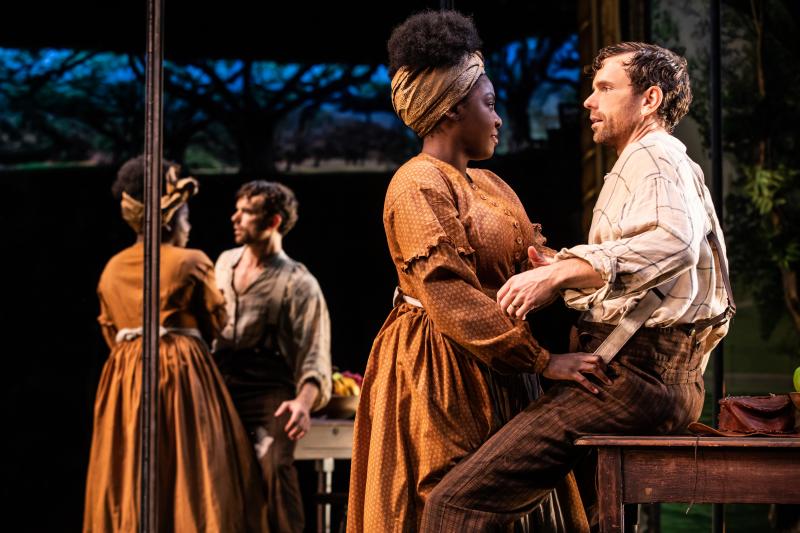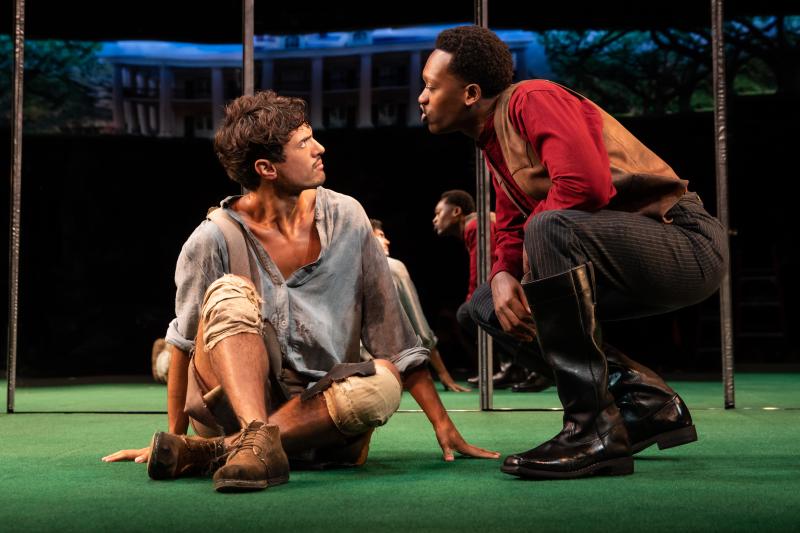Review: Jeremy O. Harris' Bold and Dynamic SLAVE PLAY Moves To Broadway
Once in a while, after attending a play, a theatre critic will receive an email from the press agent asking not to reveal certain details and/or plot twists in their review; things that go beyond the normal scope of spoiling the ending.

(Photo: Matthew Murphy)
No such email was sent before this critic wrote extremely enthusiastic praise for Jeremy O. Harris' Slave Play during its initial run at New York Theatre Workshop, but subsequently, especially since the Broadway transfer was announced, the tremendous amount of promotion for the play has focused on its initial scenes, revealing no specifics on the unexpected route where the playwright guides his characters.
So this review will be a little vague about what happens during the second and third acts of the two hour long intermissionless play. Those desiring a full description of the plot can read the initial review here.
But one point must be made specifically and clearly. Slave Play ventures into subject matter the likes of which this playgoer has never seen presented on Broadway, and does so in a bold, even outlandish manner that should be admired and welcomed. This older straight white critic won't claim to get everything the 30-year-old gay African-American playwright is saying, but if voices like his -- those that have long been nurtured and developed by non-profit Off-Broadway -- can be commercially accepted on Broadway, the fabled boulevard can advance just a little closer to truly being the artistic center of American theatre.
Performed without a curtain, designer Clint Ramos' mirrored wall symbolically, or perhaps accusingly, reflects a full view of the audience back to viewers. Above it is displayed a lyric from Rihanna's "Work": "Nuh body touch me you nuh righteous."
The song's title is also the title of the first act, which features audio snippets from the recording that serve as inspiration for the first character who enters.
.jpg)
(Photo: Matthew Murphy)
She is the enslaved, but free-spirited Kaneisha (Joaquina Kalukango; the only cast member who was not in the Off-Broadway company), confined to the McGregor Plantation, a few miles south of Richmond, Virginia.
Distracted from her work, Kaneisha wishes to be sexually degraded by overseer Jim (Paul Alexander Nolan), hinting that she might deserve to be punished with a whipping. But while Jim is willing to give it a go, he recoils at treating her disrespectfully, expressing a desire to give her sexual pleasure, rather than pain.
Meanwhile, mistress of the house, Alana (Annie McNamara) gets aroused by the handsome and enslaved Phillip's (Sullivan Jones) violin playing and anally rapes him with a dildo while he obediently endures. Outside, Gary (Alto Blankson-Wood), designated as slave-in-charge, orders around white indentured servant Dustin (James-Cusati-Moyer). They engage in a power struggle as the two get nearly naked together. Is the one who achieved org*sm in control, or does the one who gave it to him have the advantage?
Harris calls his play "a comedy of sorts" and under the sharp direction of Robert O'Hara, these first encounters take on an over-the-top tone reminiscent of Charles Ludlam's Ridiculous Theatre style. (Intimacy and fight director Claire Warden makes valuable contributions.) Anachronistic choices in music, props and underwear help separate the acts of sexual violence depicted from reality, but nevertheless there are bound to be those who will find parts of these scenes disturbing.

(Photo: Matthew Murphy)
In the second and third acts, it becomes apparent that sex and rape are the conduits through which Harris explores issues of privilege, communication and racial definition. As seen on stage and clearly dictated in the script, each character is diverse from the others in terms of gender, sexuality and skin shade. A very light-skinned person of color is outraged at being mistaken for white.
"It's ignorant. It's erasure and it's... f-ing violent."
But a dark-skinned African-American calls him out on the cultural acceptance he seems to willingly enjoy.
Another African-American claims to not feel any racial identity, a privilege granted to him by his attractiveness.
"I'm just a sort of like... Just a hot guy who's not exactly black or white."
But the theme most fully explored involves a character played by Kalukango, who, for a combination of reasons, desires her partner to participate in her rape fantasy. Her partner, who is not of African descent and speaks in an accent that indicates overseas heritage, finds the idea repulsive. This is where Harris explores privilege in, at least to this reviewer, his most unexpected manner, sacrificing true communication and the understanding of unavoidable perceptions by placing a partner on an unwanted pedestal. Exposing raw vulnerability, Kalukango achieves heart-tearing power as her character demands for her needs to be understood and taken seriously.
Some may be shocked, or even angered as the final scene vividly plays to its violent conclusion. Others may nod their heads in recognition of a truth they've never seen played out on a Broadway stage. But that can be said of so much of this dynamic artistic exploration.
Reader Reviews



